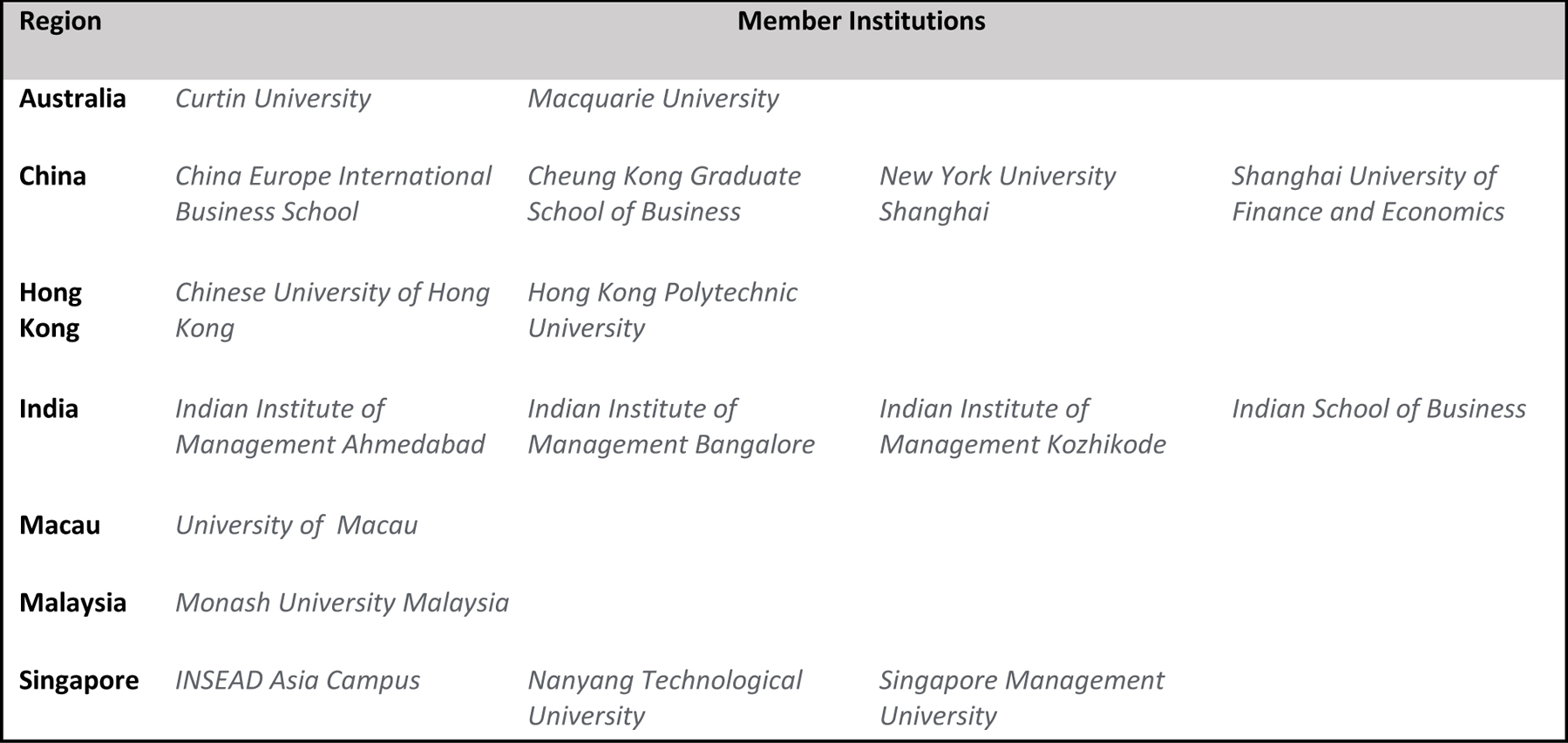Introduction
The Asia Pacific Business Schools Librarians' Group (APBSLG) was established in 2003 when the INSEAD Asia campus library hosted the inaugural meeting in Singapore. Members come together at an annual conference, usually of two-day duration. The location rotates among members, and it is an opportunity to experience different cultures, sample delicious cuisines, share innovative ideas, discuss challenges, and engage with professional colleagues. Because of the pandemic, the APBSLG held virtual annual conferences in 2020 and 2021.
There are currently 17 member organizations of the APBSLG representing business schools and universities from Australia, China, Hong Kong, India, Macau, Malaysia, and Singapore. During the year, the group uses email to share experiences and seek advice on vendors, databases, and any other questions where combined group knowledge can assist.
The 2021 Annual Asia Pacific Business School Librarians’ Group Conference
Each region nominated a representative to summarize their responses to the pandemic, and while the APBSLG members had different experiences, there were many common challenges. Libraries faced reduced staff numbers, budget constraints, maintaining staff well-being, implementing online services to academics and students, and navigating access to content not available online.
Loss of International Students
Before COVID-19, higher education providers across Asia and Australia successfully focused on attracting international students to their campuses. The World Bank (2020) reported that, while percentages varied, several universities had significant numbers of international students, such as Hong Kong University, with 43 percent of the students being international students. Revenue generated by international students has been important to many of the higher education providers represented by the APBSLG. Revenue loss caused by the pandemic has impacted library budgets and the services provided. This was one of several topics discussed by members at the 2021 meeting.
International education was the fourth largest export in Australia in 2019, and this sector was hit harder financially than any other non-agricultural industry. The Australian Government excluded universities from accessing JobKeeper, a wage subsidy program extended to most industry sectors. While job losses in the sector have varied, it is estimated that up to 40,000 staff lost their jobs during the pandemic (MacGregor, 2021).
The pandemic has forced the higher education sectors in Asia and the Pacific to examine their dependence on international students. Colleagues from the APBSLG libraries reported that many domestic students who would typically study abroad stayed in the country and attended local universities.
Complying with COVID-19 Regulations
APBSLG member libraries were subject to various compliance conditions and regulations depending on their country. There were even regional or state-specific variances within countries. In April 2020, Western Australia closed its borders to the rest of Australia and the world for almost two years. The remainder of Australia experienced rolling lockdowns, with most library staff working from home or in staggered work teams.
Not all member libraries closed completely. Some were open only to library staff, while others allowed attendance by small groups of students at any one time. Many libraries started opening up by mid-2020.
In India, some libraries were never completely closed and quarantined only if library staff were infected with COVID-19. Other Indian campuses adapted to local restrictions governing their accessibility. The Singapore libraries had to respond and adapt to their government’s frequently changing control measures. Library staff at the Monash University Malaysia campus went into a lockdown situation for almost 1.5 years.
Staffing
Most member libraries had reduced budgets with a flow-on effect on staffing. The Monash University Malaysia library underwent an organizational restructure that reduced staff from 30+ to 23. In Australian libraries, staff were rarely replaced when they left, and voluntary redundancies were encouraged.
In Hong Kong, members reported an increase in the number of new opportunities available for library professionals as library staff retired or emigrated to other countries, reflecting the prevailing political situation.
Reframing Challenges as Opportunities
APBSLG members agreed that 2021 had been challenging mentally, physically, and financially. Looking back on the presentations, it is apparent that many challenges and solutions were being reframed as opportunities that could be built on and used in the future to deliver better services to staff and students. There were also many examples of collaboration with academics, vendors, and other libraries, some of which have been listed below.
The pandemic influenced the format and type of resources purchased. Restricted access to print collections meant that libraries began moving from a digital preferred to a digital first policy when making purchasing decisions. This trend was happening before 2020, but the pandemic increased the acceptance by staff and students.
Where previously there had been some reluctance from academics to invest time in providing in-depth feedback on electronic resources, the pandemic provided an opportunity to engage closely with university staff to review the allocation of resources. While striving to get the most value from resources, the reality of reduced budgets saw academics and librarians working together to analyze and evaluate purchase options.
Librarians embrace the philosophy of open educational resources (OER), and while academics generally support the concept, they often lack time to participate in developing them. This changed during the pandemic, with many APBSLG libraries encouraging the use and production of OER textbooks. Library staff at Monash University Malaysia worked with academics to create their own OER textbooks. Colleagues from India reported increased use of OER textbooks because of the difficulties and costs of obtaining e-textbooks.
Members reported that there was a focus by library staff to provide as much support as possible to students going through the upheaval of the pandemic. All the APBSLG libraries pivoted to delivering online learning and support within a very short time, but there were also other innovative outcomes during this time.
The Cheung Kong Graduate School of Business University was one of many libraries that saw the opportunities in delivering online workshops. After returning to in-person classes in September 2021, the library continued hybrid classes. In an innovative move, the library developed Zoom Zones for students, where they could attend Zoom classes.
Colleagues at the Nanyang Technical University library converted space in the library’s quiet zone dedicated to students’ well-being. The space is named Hygge as a nod to the Danish word for well-being and coziness.
The New York University Shanghai Library contributed to a Digital Teaching Toolkit developed by the University. The library guide includes a curated list of digital tools and software recommended by the Research and Instructional Technology Services library team (NYU Shanghai, 2020).
In India, access to library databases has become the essential source of information for many students. Colleagues at the Indian Institute of Management Bangalore reported that students from remote parts of India with little access to the Internet could live on campus following a quarantine period and then use the remote access to resources from the library. Library staff made themselves available to answer questions from students until 10 pm via mobile phones.
Most of the APBSLG members reported increased usage of library services during the pandemic, which has continued as libraries slowly opened. All member libraries continue to deliver workshops either online or in a hybrid mode. Increased attendance at online workshops suggests that this trend will continue. Acceptance of online delivery of workshops and services by academics, students, and library staff has resulted in a more inclusive library service than pre-pandemic.
Conclusion
The World Bank (2020) predicts that the effects of the pandemic will have an ongoing impact on higher education in Asia and the Pacific. The experiences of the APBSLG members appear to support this view. The many innovative services developed during the pandemic will become the accepted, and even expected, way of service delivery to domestic and international students.
Librarians have continued to provide outstanding services to students and academics throughout this pandemic. The overriding picture that emerges from the 2021 APBSLG meeting is the dedication shown by library professionals to ensuring that academics and students have continuing access to library resources and services during the worst of times. We must remember that, as much as we wish to return to normal, we are not yet there. Finally, our colleague Namita Santra summarized the spirit and work of library professionals everywhere during this pandemic. (See Figure 2.)
References
MacGregor, K. (2021, September 17). A study finds 40,000 tertiary jobs lost during the pandemic. University World News. https://www.universityworldnews.com/post.php?story=20210917061003607https://www.universityworldnews.com/post.php?story=20210917061003607
NYU Shanghai. (2020). NYU Shanghai makes digital toolkit available to fellow universities going online. https://shanghai.nyu.edu/news/nyu-shanghai-makes-digital-toolkit-available-fellow-universities-going-onlinehttps://shanghai.nyu.edu/news/nyu-shanghai-makes-digital-toolkit-available-fellow-universities-going-online
World Bank. (2020). COVID-19 Impact on Tertiary Education in East Asia and Pacific. https://documents1.worldbank.org/curated/en/506241590701178057/COVID-19-Impact-on-Tertiary-Education-in-East-Asia-and-Pacific.pdfhttps://documents1.worldbank.org/curated/en/506241590701178057/COVID-19-Impact-on-Tertiary-Education-in-East-Asia-and-Pacific.pdf


